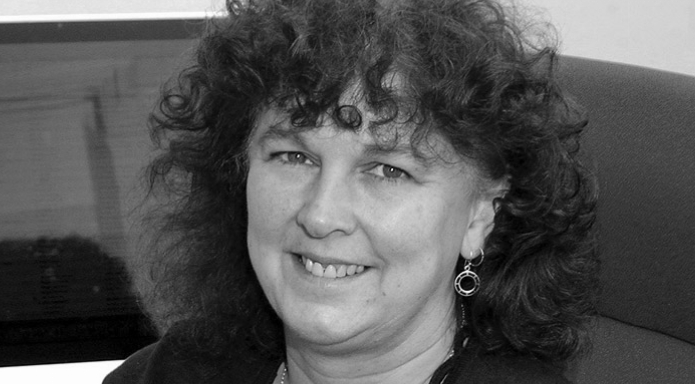Driving awareness of Scoliosis through the cloud

It’s a sad fact but despite huge advancements in technology and medicine, we still live in a world where many diseases and conditions still prevail. Including scoliosis, a condition famously associated with the world’s fastest man, Usain Bolt.
It’s a horrible condition, and results in an often otherwise healthy person suffering from the spine becoming curved or twisted, affecting their appearance and causing pain due to stress and pressure on the spine. Whilst not many people have heard of it, it isn’t rare with 3 to 4 children per 1,000 needing specialist supervision, and is estimated that up to 70% of people aged over 65 in the UK have a degree of scoliosis.
So why don’t more people know about scoliosis? Claire Curley, National Director of the Scoliosis Association UK (SAUK) and British Scoliosis Research Foundation (BSRF), says it’s down to a lack of awareness: “It’s an unknown condition. If you’re not directly affected by scoliosis yourself or because of a loved one, it’s unlikely you will understand what it is and how it affects people.”
We spoke with Claire to find out how her team is leading the charge to increase awareness of scoliosis in the UK while providing advice, support and information to people and their families affected by the condition.
A small team doing big things
Established in 1981, SAUK is the national support group for scoliosis in the UK. It’s sister charity, BSRF (British Scoliosis Research Foundation), strives to secure funding for research of the disorder. Claire’s team of four part-timers spans both: “It’s a lot of work for such a small team. There are many big charities out there that are doing fantastic work for their causes, and they receive most of the funding. This means they can afford media and marketing teams,” explains Claire. “We don’t have those levels of resources, but still have to do good work and get the word out there.”
Claire and her team do this in several ways. They man a helpline open 5 days a week, organise campaigns and awareness events, they produce two magazines, Backbone, every year to help inform those with scoliosis, host regional patient meetings with professionals, provide advice, give people the chance to have questions answered, and they run a membership scheme of over 2,500 members that helps people with scoliosis to keep in touch with one another, access support in their local area and keep them up-to- date with treatment developments: “Our job is to support anyone affected by scoliosis and to ensure they have as much information at their fingertips to answer any questions they might have,” explains Claire. “But at the same time, we need to focus on educating health professionals and the general public on the condition as communication will be key in finding a way to prevent scoliosis.”
This means producing high-quality resources for anyone who needs information on scoliosis. However, Claire says up until a year and a half ago, her team was struggling with managing the sizeable amount of content needed to create materials for their awareness campaign efforts: “We are firstly a small charity and secondly a charity that can’t afford IT support. We found that we were constantly battling trying to send emails with large files, working on out-of-date versions of files, or losing files completely,” explains Claire.
Understanding the need for a more streamlined solution for the immense amount of content her team was working with, Claire received a Dropbox Business donation through the Dropbox for Good initiative in 2015: “Dropbox is now embedded so much in the work we do at SAUK – I can’t remember how we coped without it,” said Claire.
Communication is crucial
For SAUK communication is crucial. It’s important each member can see what the others are doing: “For our awareness efforts to be successful, we need to ensure we know what each of us is working on. So, if our events manager is working on a project, our social media manager needs to be aware of everything the event entails. We must remain connected and Dropbox allows us to do that,” explained Claire. “We now have transparency across our team and know where all our files are, from photographs from events to magazine artwork. We are synced.”
It’s also proving a valuable tool in communicating with external parties like the trustees: “We keep all records and information such as minutes and agendas in one Dropbox folder for the trustees. They know it is all in one place and they can access content any time.”
Finding time to be creative
For any charity, the challenge of driving awareness is the need to be unique in the approach. Tactics to communicate can soon become outdated, so what does it take to remain creative in reaching the public? According to Claire, all you need is time: “To be creative, for us it’s about coming together as a team and brainstorming ideas face-to-face. We find we are at our most creative when we can bounce ideas of each other and come up with innovative ways of informing people about scoliosis and helping those with the condition”
But when you have only a small team of four part-timers managing an entire association, time is like gold-dust. Using the cloud to share and edit content means Claire and her team can find those treasured hours: “Before so much of our time was spent on admin tasks like creating and attempting to email zip files or search for the latest version of a piece of content to work on,” says Claire. “Using Dropbox to store, share and edit all our content has given us a lot of time back to spend on more productive tasks like brainstorming new campaigns, which results in creations like Scoliosis International Awareness Day.”
Finally, we asked Claire what advice she would give other charities who are yet to use cloud technology in their workflows. She says that while the cloud might seem complicated to some, it’s very important for small charities like SAUK that can’t afford an IT system but need to know content is safe and accessible: “Every time you adopt something new, it will take time to learn how to use it, but it will save you so much time in the long run, without the need for an IT team,” says Claire. “Speak to another charity that is using it. Talk about what they’re doing in the cloud, how easy it is use and you’ll be sold.”
To contact SAUK, you can reach them on their helpline at 02089641166 or follow them on Facebook and Twitter. To hear from more Dropbox for Good partners, click here.




